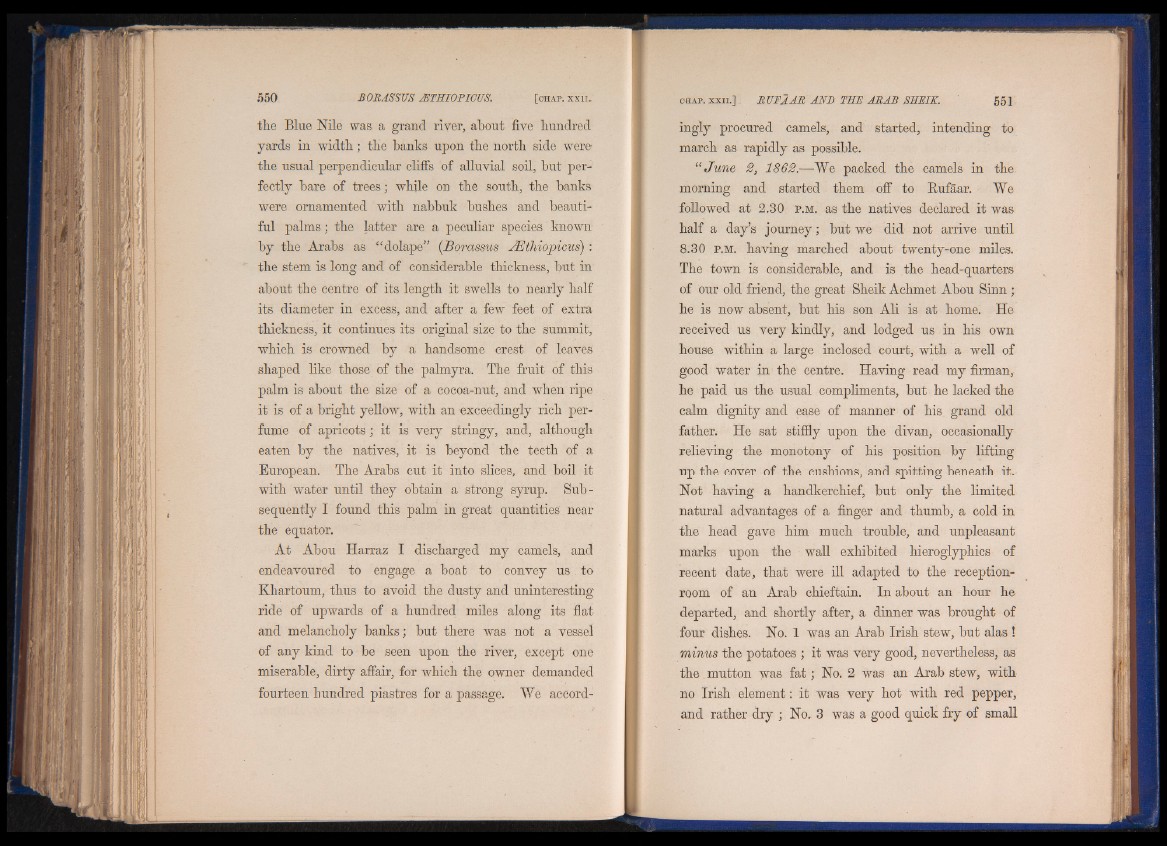
the Blue Nile was a grand river, about five hundred
yards in width; the banks upon the north side were
the usual perpendicular cliffs of alluvial soil, but perfectly
bare of trees; while on the south, the banks
were ornamented with nabbuk bushes and beautiful
palms; the latter are a peculiar species known
by the Arabs as “dolape” (Borassus AEthiopicus) :
the stem is long and of considerable thickness, but in
about the centre of its length it swells to nearly half
its diameter in excess, and after a few feet of extra
thickness, it continues its original size to the summit,
which is crowned by a handsome crest of leaves
shaped like those of the palmyra. The fruit of this
palm is about the size of a cocoa-nut, and when ripe
it is of a bright yellow, with an exceedingly rich perfume
of apricots; it is very stringy, and, although
eaten by the natives, it is beyond the teeth of a
European. The Arabs cut it into slices, and boil it
with water until they obtain a strong syrup. Subsequently
I found this palm in great quantities near
the equator.
At Abou Harraz I discharged my camels, and
endeavoured to engage a boat to convey u s. to
Khartoum, thus to avoid the dusty and uninteresting
ride of upwards of a hundred miles along its flat
and melancholy banks; but there was not a vessel
of any kind to be seen upon the river, except one
miserable, dirty affair, for which the owner demanded
fourteen hundred piastres for a passage. "We accordingly
procured camels, and started, intending to
march as rapidly as possible.
“June 2, 1862.—We packed the camels in the.
morning and started them off to Rufaar. We
followed at 2.30 p.m. as the natives declared it was
half a day’s journey; but we did not arrive until
8.30 p.m. having marched about twenty-one miles.
The town is considerable, and is the head-quarters
of our old friend, the great Sheik Achmet Abou Sinn;
he is now absent, but his son Ali is at home. He
received us very kindly, and lodged us in his own
house within a large inclosed court, with a well of
good water in the centre. Having read my firman,
he paid us the usual compliments, but he lacked the
calm dignity and ease of manner of his grand old
father. He sat stiffly upon the divan, occasionally
relieving the monotony of his position by lifting
up the cover of the cushions, and spitting beneath it.
Not having a handkerchief, but only the limited
natural advantages of a finger and thumb, a cold in
the head gave him much trouble, and unpleasant
marks upon the wall exhibited hieroglyphics of
recent date, that were ill adapted to the reception-
room of an Arab chieftain. In about an hour he
departed, and shortly after, a dinner was brought of
four dishes. No. 1 was an Arab Irish stew, but alas !
minus the potatoes ; it was very good, nevertheless, as
the. mutton was fa t; No. 2 was an Arab stew, with
no Irish element: it was very hot with red pepper,
and rather dry ; No.. 3 was a good quick fry of small